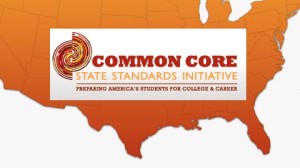 Up until now, I’ve not written anything specific with respect to the Common Core program being promoted from on high and apparently accepted as a guideline/goal by more than forty states. The promise is that it will set standards to prepare students for college and the workplace. Thus far, standards have been set for math and English language, with plans to extend them to other subject areas.
Up until now, I’ve not written anything specific with respect to the Common Core program being promoted from on high and apparently accepted as a guideline/goal by more than forty states. The promise is that it will set standards to prepare students for college and the workplace. Thus far, standards have been set for math and English language, with plans to extend them to other subject areas.
One reason why I’ve not waded into this field prior to now is that I have almost no interest in it. I realize that may sound strange, coming from an educator. As a university professor, shouldn’t I care about this? Well, I do care. It’s just that I’ve never had any faith whatsoever in any “plan” to raise educational standards, especially any plan imposed from those who consider themselves to be the experts. Above all, I’ve never accepted the rationale that education is a legitimate function of the government, whether at the federal or state level. Therefore, my interest level in what they propose is naturally low.
I have seen the critiques of Common Core from the perspective of those who believe it actually lowers expectations rather than raising them. The critiques sound reasonable. Even though there are some cultural conservatives backing this initiative, I think they are misguided in their support. They mean well; they want higher standards in theory. Yet there are solid reasons to doubt that Common Core will provide them.
That’s the practical level of criticism. My critique, as I’ve already noted, is more basic. I’m opposed to any government-sanctioned and/or government-funded plan. Education is the responsibility of the parents who, ideally, should have a market in the private sector from which to choose the source of their children’s education. We messed that up in the mid-nineteenth century when we began to set up state educational establishments called boards of education.
All studies show that children educated at home or in private schools perform significantly better on standardized tests (another bugaboo of mine, but I’ll set that aside for the moment). As public policy, government at both the federal and state levels should be expanding the private sector in education, not seeking to curtail it or force it into a predetermined mold like Common Core.
 Proponents have sold Common Core as a grassroots movement; it’s anything but that. All one has to do is look at an incident last week in Maryland where one parent, Robert Small, stood up and raised his objections to the orchestrated meeting parents were attending to learn more about the plan. He was frustrated by the lack of interaction allowed at the meeting; everything was prearranged to push parents into approving the new standards, with no other views allowed to be expressed. For his “repugnant” act of standing up to the educational establishment, he was ushered from the room by security and threatened with prosecution. A little bit of common sense prevailed when that specific threat was withdrawn.
Proponents have sold Common Core as a grassroots movement; it’s anything but that. All one has to do is look at an incident last week in Maryland where one parent, Robert Small, stood up and raised his objections to the orchestrated meeting parents were attending to learn more about the plan. He was frustrated by the lack of interaction allowed at the meeting; everything was prearranged to push parents into approving the new standards, with no other views allowed to be expressed. For his “repugnant” act of standing up to the educational establishment, he was ushered from the room by security and threatened with prosecution. A little bit of common sense prevailed when that specific threat was withdrawn.
 This is the face of the Common Core establishment in action. I cannot support it. I’m pleased to report that Rick Scott, governor of my state of Florida, shortly after that incident, withdrew our state from the Common Core testing regimen. Hopefully, that is the first step toward complete disengagement from the plan. I have a feeling, as protests mount, that a number of states who originally signed on to this initiative will have second thoughts and withdraw as well.
This is the face of the Common Core establishment in action. I cannot support it. I’m pleased to report that Rick Scott, governor of my state of Florida, shortly after that incident, withdrew our state from the Common Core testing regimen. Hopefully, that is the first step toward complete disengagement from the plan. I have a feeling, as protests mount, that a number of states who originally signed on to this initiative will have second thoughts and withdraw as well.
Early Americans were always cautious about handing over control of their children’s education to the government. Their concerns were specific:
- The threat of the government dictating the type of education, and of determining what is acceptable and what is not, thereby opening the door for tyranny.
- The threat of removing the responsibility of education from the proper sphere of family, church, and locality.
- The threat of higher taxes to pay for whatever the government deemed to be “legitimate” education.
In other words, they feared government control over the minds and pocketbooks of citizens.
By the way, search as you might through the federal Constitution, you will never find any authorization for the federal government to legislate or spend even one cent on education. It’s time to get that level of government out of the education business. Then we can work on getting states out of it also. The private sector will do just fine educating the next generation, particularly if we return all that tax money to the parents and hold out tax privileges to those who wish to contribute voluntarily toward helping those who might not be able to afford tuition.
Yes, there is a path toward better education, but it doesn’t come via Common Core.

